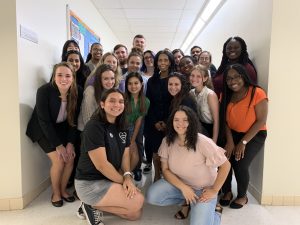Dr. Tucker’s Health Psychology Research Team investigates psychological and behavioral factors associated with attaining and maintaining health.
Initial research conducted by this team focused on health-risk and health promoting behaviors among culturally diverse youth living with at least one chronic illness and living in low-income families (each youth’s mother also participated). This 18-month study (called the Children’s Health Self-Empowerment Project) was funded by the Florida Department of Health and implemented in conjunction with Children’s Medical Services in Gainesville, Florida. Findings from this study indicated that the effects of a workshop intervention differed for African Americans as compared to White Americans relative to various health promoting behaviors (e.g., eating a nutritious diet). Subsequently, Dr. Tucker was awarded a 3-year grant by the PepsiCo Foundation to build on and extend the focus of the Children’s Health Self-Empowerment Project. The goal of this recently completed multiphase research study (called the Family Health Self-Empowerment Project) was to evaluate a comprehensive set of integrated interventions designed to modify and prevent overweight and obesity among children, adolescents, and adults.
One important focus of the Health Psychology Research Team has been to develop and empirically test Dr. Tucker’s literature-informed, culturally sensitive Health Self-Empowerment Theory, which asserts that health promoting behavior can be predicted by the following five health-related psychological variables: health motivation, health self-efficacy, health self-praise, active coping skills, and health responsibility. Findings from the Children’s Health Self-Empowerment Project provided support for Health Self-Empowerment Theory in terms of predicting health promoting behavior among (a) culturally diverse youth living with at least one chronic illness and living in low-income families and (b) these youths’ mothers. These research findings informed the development of culturally sensitive health self-empowerment theory-based health promotion interventions which were then tested in the Family Health Self-Empowerment Project.
Graduate Student:
Meagan Henry
Meagan is one of Dr. Tucker’s Counseling Psychology PhD students at the University of Florida. She received her Master’s in Psychology from New York University, and her B.A. in Psychology from Villanova University. Before coming to UF, she was a project coordinator for a text-message based smoking cessation intervention in the SCOUT Lab at Miami University of Ohio. When she is not working with the Data Management team in the Health Psychology Lab, she is probably spending time with her friends and her cat, or adding to her collection of houseplants. Her research interests include:
- Using mobile health technology to increase access to mental health care
- Improving mental health outcomes in older adult populations
- Addressing health disparities in undeserved populations
Congratulations to the following RA’s for receiving these awards and accomplishments!
Terry Derias
2018: Researcher of the Semester Award
2019: Excellence and Leadership in Data Management Award
Hannah Wilson
2020: Presidential Service Award
Asena Markal
2020: Accepted into the UF College of Medicine C/O 2024 through the Medical Honors Program
Emily Bosworth
2018: Dean’s List Award
Fall 2019: Dean’s List Award
Fall 2019: Researcher of the Semester Award
Spring 2020: Poster accepted in the Undergraduate Research Forum
Kendal Updike
2017-2018: Eugene Chester Terzenbach Memorial Scholarship Recipient
2018-2020: Robert J. and Jane H. Barben Family Scholarship Recipient
2020: Accepted to Texas A&M’s College of Medicine for Fall 2020
Francis Rivas
2017-Present: Machen Florida Opportunity Scholar
Spring 2019: Researcher of the Semester Award
Fall 2019: Outstanding Researcher of the Semester Award
Phebe Brocke
March 2017: John V. Lombardi Scholar
Fall 2019: Deans List College of Health and Human Performance
Spring 2020: Gareth Kerr Memorial Award
Erin Kim
2020: Poster Presentation (Relationship Between Food Security and Perceived Levels of Stress Among Low-Income Black Seniors in Health Zone 1) at the Spring Center for Undergraduate Research Symposium

